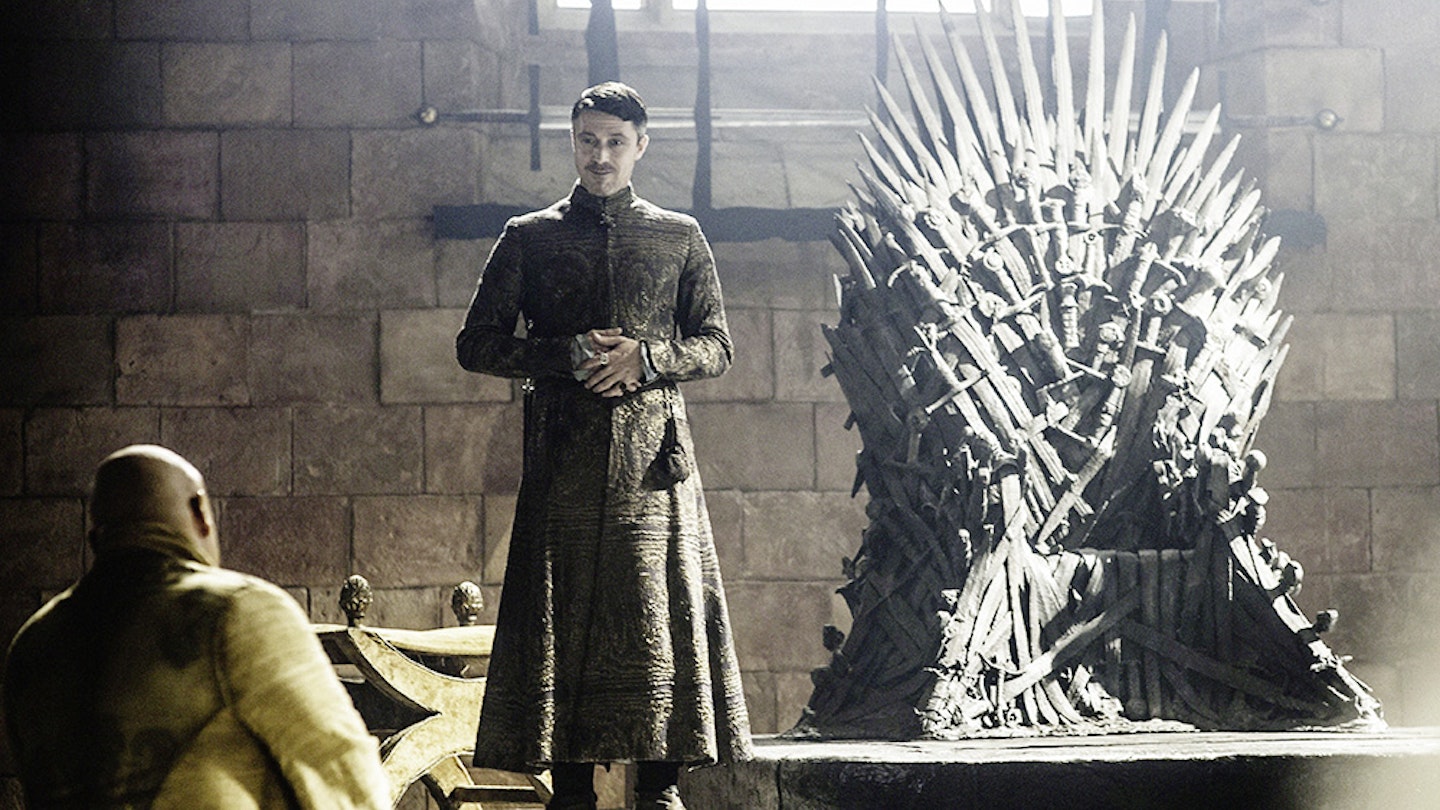The phenomenal success of Game Of Thrones is down to its reality, rather than its fantasy, argues historian Tom Holland.
This feature was originally published in Empire Magazine issue 323 and contains spoilers for those who are yet to see Season 5 in its entirety.
In Game Of Thrones, there is really only the one throne that matters. It sits in the Red Keep of King’s Landing, the mighty seat of royal power from which, in HBO’s adaptation of George RR Martin’s epic series of novels, kings have been ruling Westeros for 300 years. Forged out of swords melted by dragon breath, it commemorates the great feat of conquest that had seen a single, continent-spanning realm fashioned out of seven previously independent kingdoms. Throughout the series, it serves as a menacing stage-prop: a reminder of what is at stake. No one can hope to be crowned as victor in the game of thrones until he — or she — sits on it unchallenged. “The swords of the vanquished, a thousand of them, melted together like so many candles”: such is the Iron Throne.
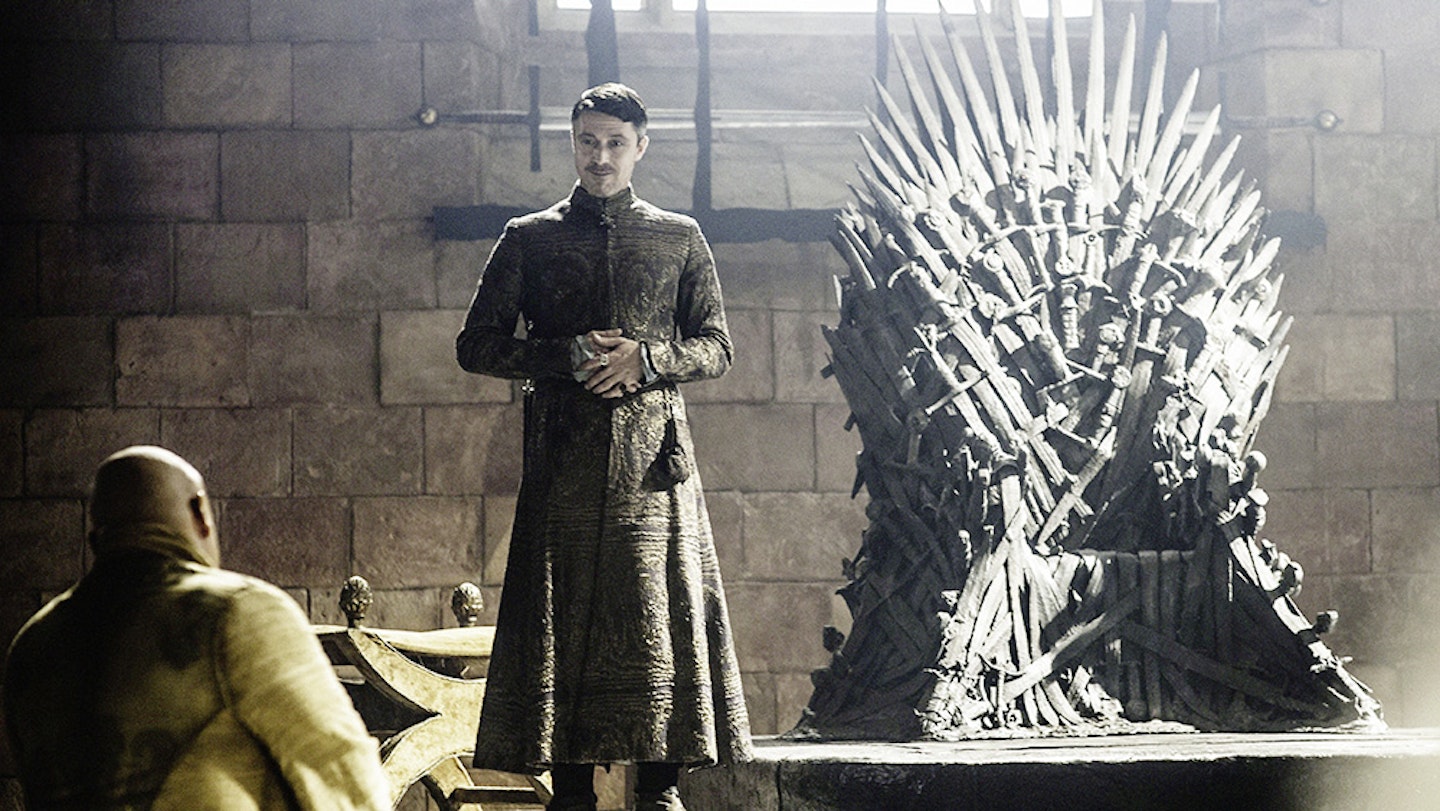
Or is it? Although Game Of Thrones, with its dragons and 700-feet wall of ice, is recognisably fantasy, there are people in Westeros no less hard-headed and sceptical of myth than in our own world. Power does not belong only to those who wear crowns on their heads, and it is often those who lurk behind the Iron Throne who understand its workings best. In a seminal scene from Season 3 episode The Climb, two of these functionaries meet: Varys, the royal spymaster (Conleth Hill), and Petyr Baelish, the King’s Master of Coin (Aiden Gillen). Both are cynical and ruthless; both are able to penetrate with a pathologist’s eye into the darkest recesses of human nature. The lessons they draw, though, are very different. When Varys, gazing at the Iron Throne, refers to the thousand swords from which it has supposedly been made, Baelish scoffs that in reality there aren’t even two hundred. “But what do we have left,” Varys demands, “once we abandon the lie?” Swift and sure comes the answer: “Chaos.”
Power does not belong only to those who wear crowns on their heads.
Power-brokers in the Republican Party or the European Union are doubtless having very similar conversations right now. Naturally, the personal stakes in Westeros are considerably higher than in Washington or Brussels. Those who play and lose in its game of thrones risk losing their heads — or at a minimum, their genitals. Varys himself, castrated as a child by a sorcerer who then burnt his scrotum and penis as part of a magic ritual, has no illusions as to the depths of horror which can engulf a society. Chaos, he declares, is a pit — and he has no wish to fall into it. Amoral though he appears, secretly he is working to redeem Westeros from ruin. Game Of Thrones would not have become the astonishing success it is without offering its viewers some genuine heroes. Codes of honour and displays of kindness are to be found even in the darkest places.
Repeatedly, though, they gutter, or else are snuffed out altogether. “Chaos isn’t a pit,” Baelish tells Varys. “Chaos is a ladder.” Loyalty to the realm, or the gods, or love: all are illusions. “Only the ladder is real. The climb is all there is.”
Baelish himself, as murderous as he is subtle, proves as adept as anyone at scaling it; but he is certainly not alone in exploiting the steady implosion of Westeros into civil war. As it splinters, so the lineaments of the seven kingdoms absorbed into it long previously start to show again; and as they show again, so the ambitions of rival houses turn ever more carnivorous. The truth is — as Game Of Thrones has brutally demonstrated over the course of its five seasons — that both Varys and Baelish are right. Chaos simultaneously engulfs and elevates. The deeper the pit, the more tempting the ladder.
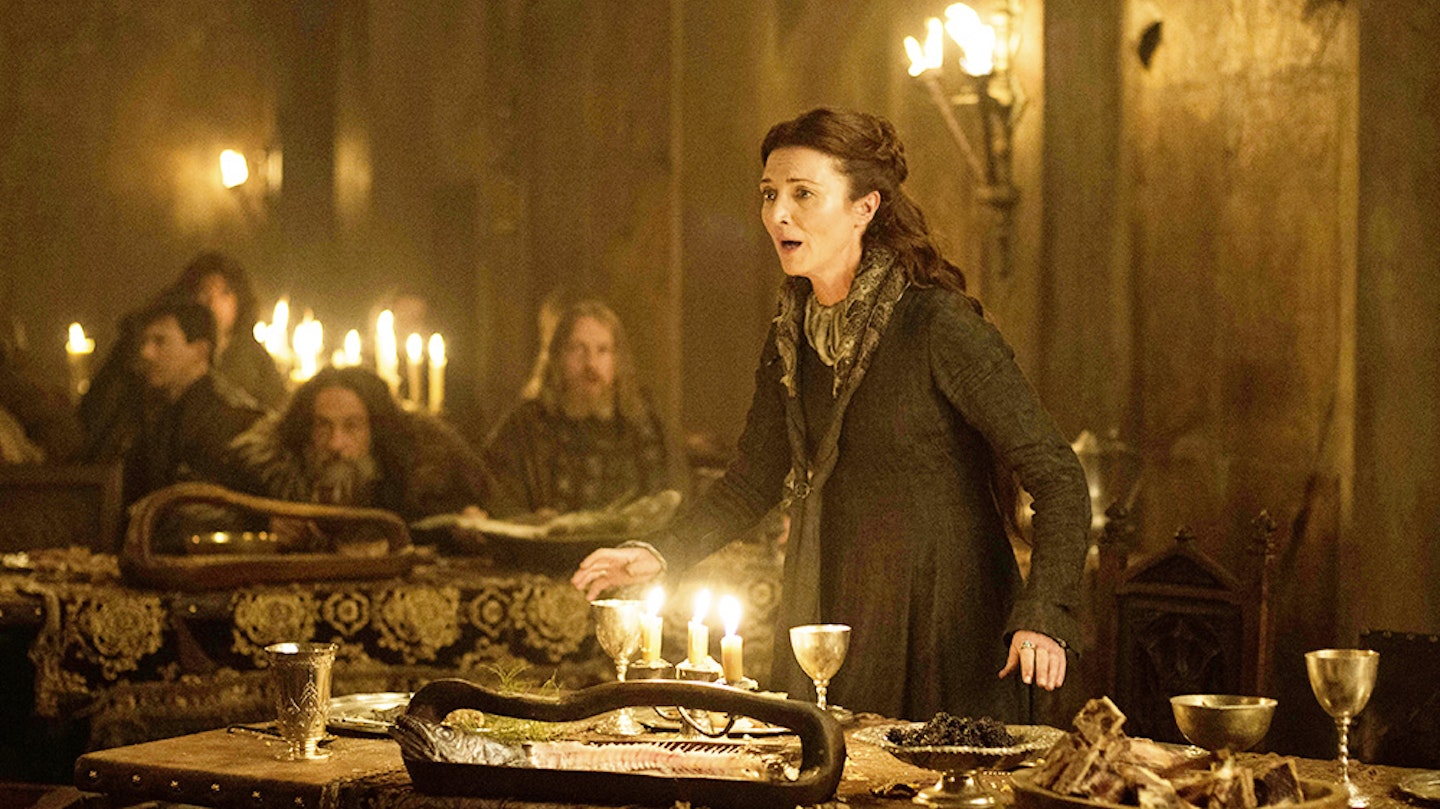
The consequence is the prodigious spectacle of death and suffering for which Game Of Thrones has become notorious. Even as it has replaced Harry Potter as the surest source of employment for British character actors, so also do its blood-spattered plots necessitate a relentless culling of the cast. Stars who in any other series would have been able to book in for the long haul are liable to find themselves chewed up and spat out. The trick pulled by Hitchcock in Psycho, of dispatching a seemingly central protagonist less than half-way through the film, is one that Game Of Thrones has repeatedly played on its viewers. Footage of people watching the climax of Season 3, when a whole slew of much-loved characters were wiped out in a single sitting, rapidly went viral. Viewers gasped, cried out in horror, clasped their hands to their mouths. Rare is the TV drama that has been able to deliver such a shock.
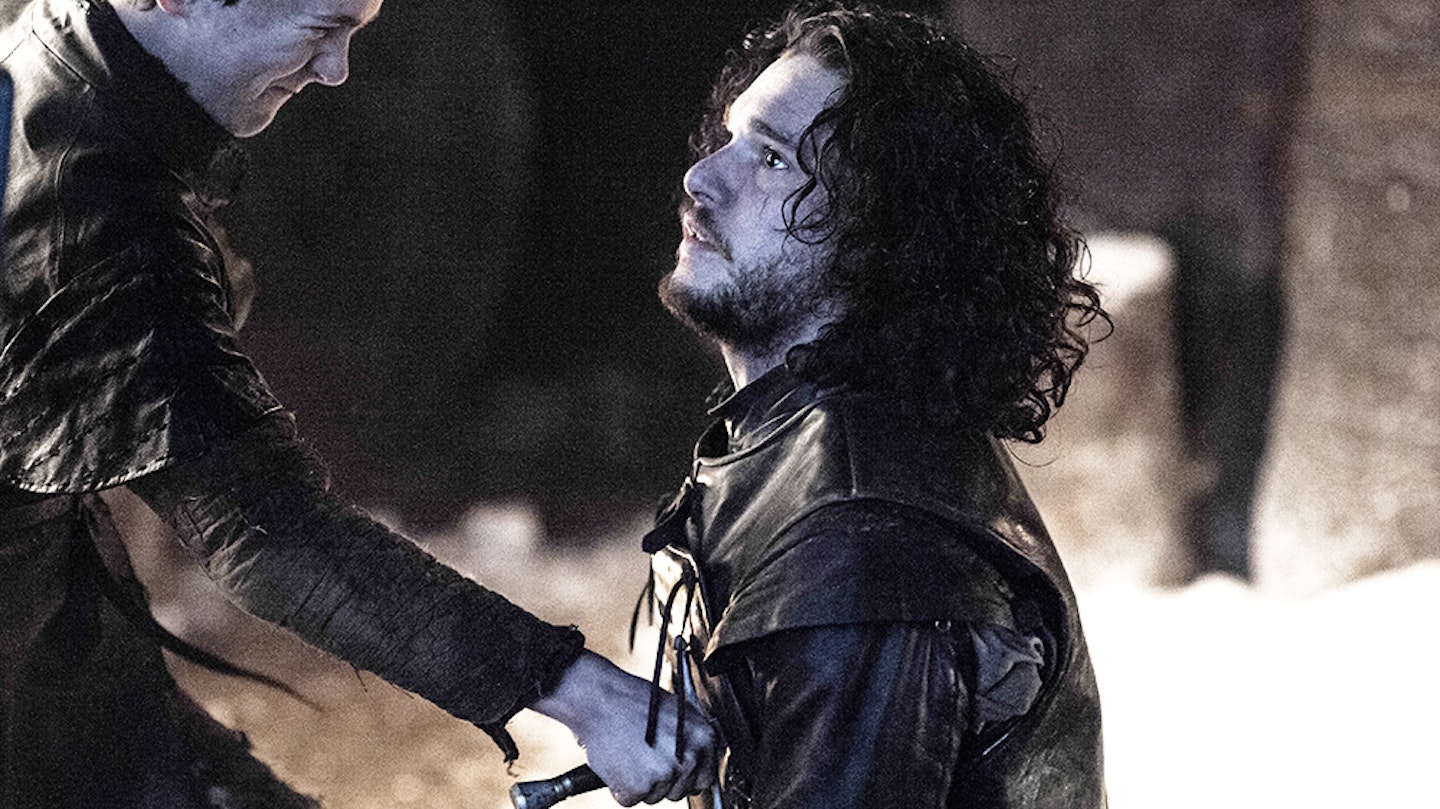
Rare is the TV drama that has been able to deliver such a shock.
Some of us, of course, had known full well what was coming. Because, for five seasons now, the TV series has been able to track the books that inspired it, readers of George RR Martin’s novels have invariably had a head start. Already, though, last season, that was starting to change. Assorted plot-lines began to go dramatically off-piste. Various hideous things happened that the novels had failed to flag up. When, in the last scene of the series, Jon Snow was shown bleeding to death, Martin’s readers were left as uncertain as everyone else whether he was truly dead.
Winds Of Winter, the next in his sequence of his novels, and which had originally been slated for publication before Christmas, remains unfinished; and as a result, as Martin himself has put it, “there will be certain plot twists and reveals in Season 6 of Game Of Thrones that have not yet happened in the books.” The previews, making play with this, have been pointedly enigmatic. One shows the Hall of Faces, an enormous vault deep in the bowels of a great stone temple, where the faces of the dead are kept — and although some belong to characters already slain over the course of the series, others do not. “They have no idea what’s going to happen,” a voiceover intones. For the first time, this is true of pretty much everyone.
The same, of course, could be said of the new season of any number of series, from Brooklyn 99 to Downton Abbey. Never before, though, has there been a show quite on the scale of Game Of Thrones. What happens to its various protagonists reverberates across continents and kingdoms.
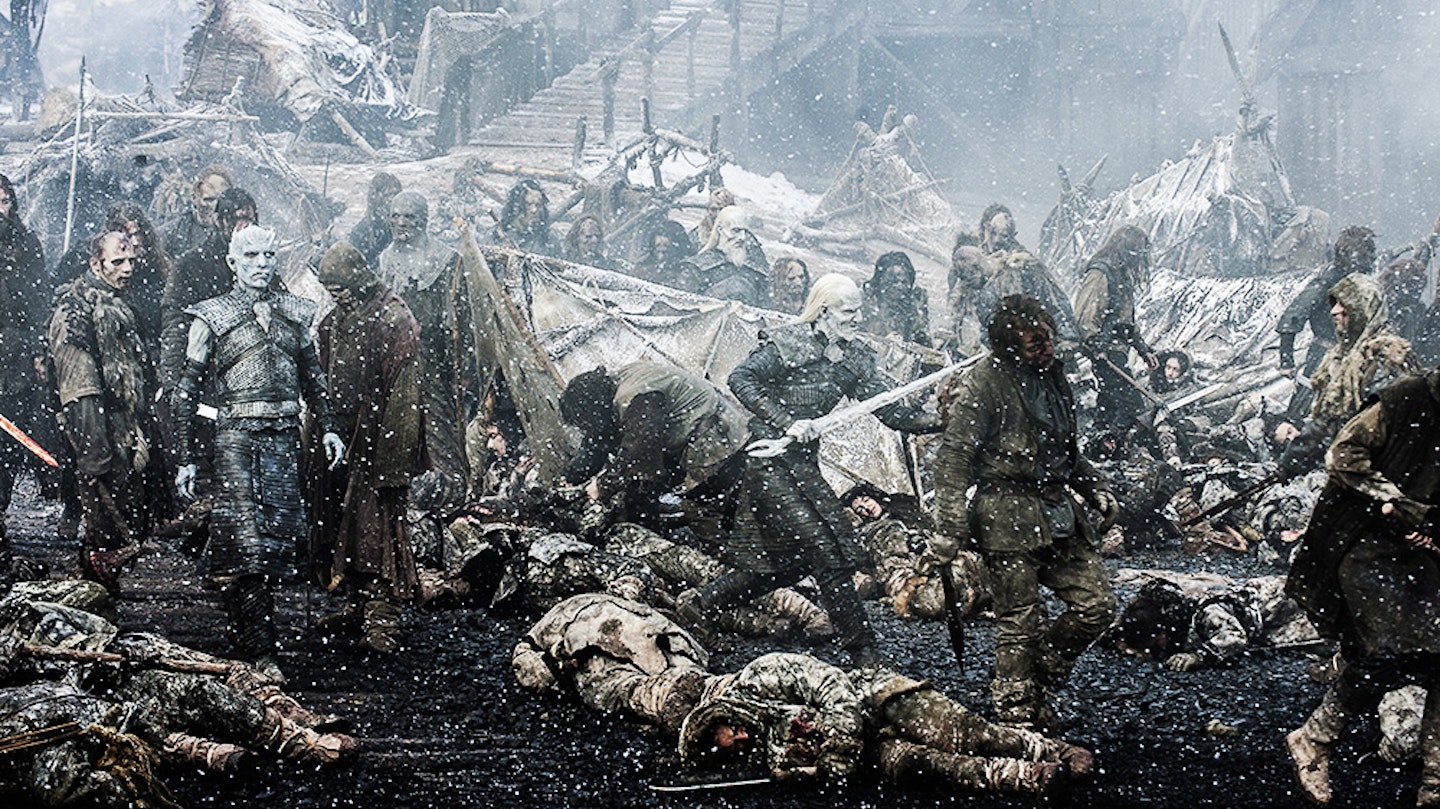
As in Martin’s novels, so in the TV adaptations: the fascination of the series lies as much in the detail as in the plotting. Rarely does anything happen so extraordinary that it slips the moorings of a vividly evoked sense of place. An army of mouldering corpses storms a distant northern harbour in Season 5 episode Hardhome, and it is less the immaculately realised special effects that make it seem credible than the chill lapping of the ocean, the wisps of icy mist, and the portrayal of an entire way of life under siege. In Season 3’s fourth episode, a dragon incinerates a slave-master with a single blast of breath, and his death, rather than seeming something conjured up from folktale, serves instead as the emblem of a social revolution.
Spanning as it does the extremes of ice and fire, the world of Game Of Thrones provides an immersiveness that is without precedent in the genre of TV fantasy. Zombies and dragons have no more starring a role in it than do its class structures, or its religious tensions, or its attitudes to the respective roles of men and women. Three-eyed ravens alternate with bankers; shape-shifters with smugglers. The appeal of the world portrayed in Game Of Thrones is not that it is fantastical, but that it is precisely the opposite: richly and brutally real.
All of which helps to explain why it is not just the greatest fantasy epic ever shown on TV, but the greatest historical epic as well. Westeros is recognisably bred of Europe’s past. The series’ back-story echoes the period which Shakespeare covered in his first series of history plays: the 15th century Wars of the Roses, which saw the rival houses of Lancaster and York feuding over the English crown.
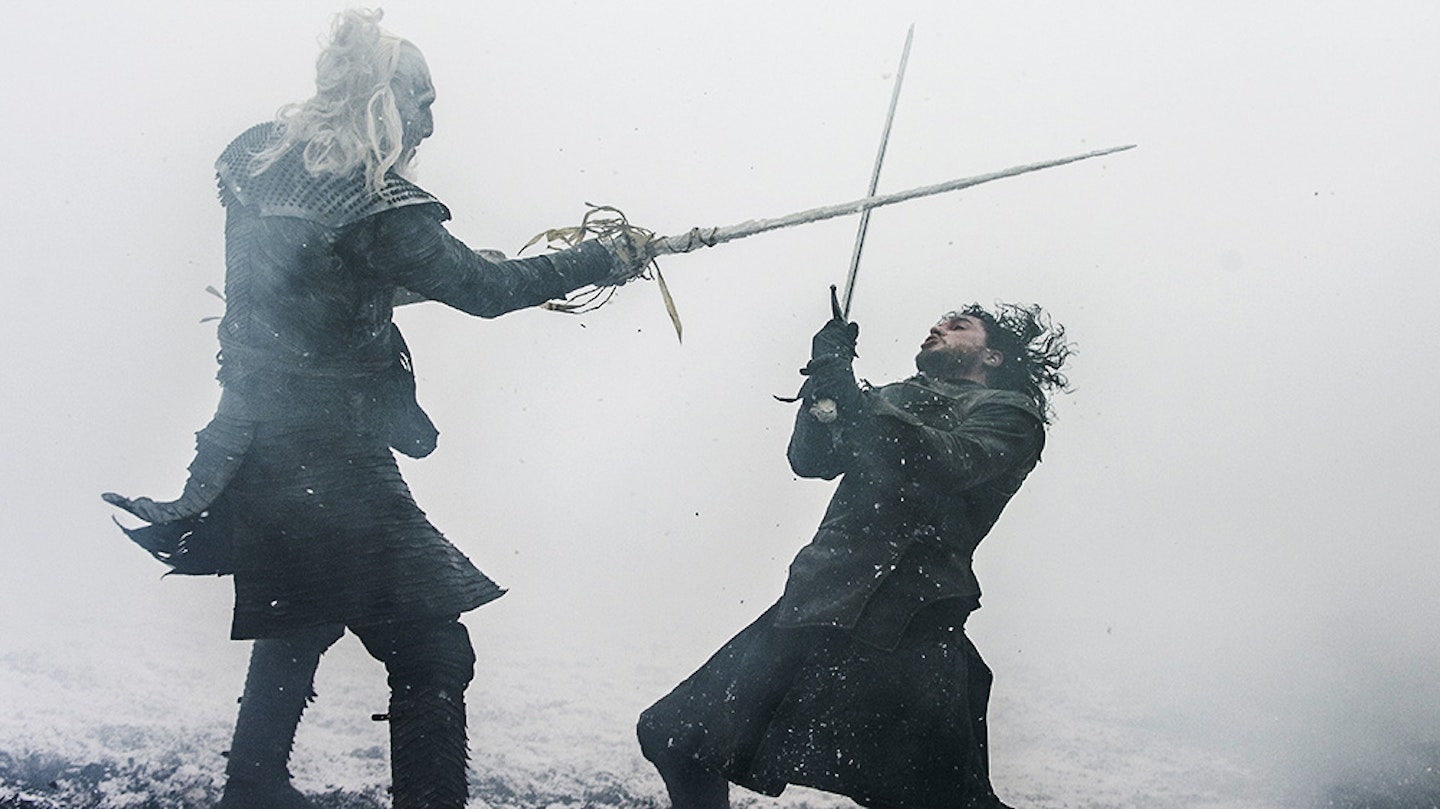
Head north, though, and the further from King’s Landing the action moves, the further back in time it seems to take us. Banners flutter, donjons soar into the sky, and knights errant undertake quests across landscapes that seem conjured from the heyday of the Middle Ages. Further north yet, an offshore kingdom armed with longships echoes Viking Scandinavia, while Winterfell, the stronghold in which the series opens, has more than a touch of the Anglo-Saxon. At its very northernmost limit, the kingdom ruled from King’s Landing is guarded by a massive rampart of ice: a defensive line that Martin has readily acknowledged was inspired by a visit to Hadrian’s Wall. As in the Roman Empire, though, so in Westeros, the world does not end at the frontier of civilisation. Continue north, and the journey back into prehistory is precipitous. The snowy landscape beyond the Wall, complete with shamans and woolly mammoths, is recognisably that of the Ice Age. The nightmares that are bred there too, and which cast their shadow over the very first sequence in Game Of Thrones, seem conjured from a primordial darkness. If winter is coming, then it comes from the fabulously distant past.
The genius of Game Of Thrones is to let us experience what it is like, when looking to the medieval past, not to know who wins.
“Fear is for the long night, when the sun hides for years and children are born and live and die all in darkness.” So an old woman, the nurse of a son of the lord of Winterfell, tells her charge early in the first season. “That is the time for fear, my little Lord, when the white walkers move through the woods.”
That the long night may now at last be at hand, and the white walkers with it, does not diminish the potency of Game Of Thrones as a historical drama. Just the opposite. Dread of apocalypse, be it in the form of a wolf devouring the sun or a war in the heavens, haunted the imaginings of our ancestors. Ominous wonders were as assiduously tracked as the course of the harvests. Dragons in the skies were believed to portend the deaths of princes. As in Westeros, so in medieval Europe: the peril that was believed to lurk in the dimension of the supernatural could seem no less real than plague, or famine, or war.
The Iron Throne, bristling and brooding, remains at the start of Season 6 in the Red Keep: the ultimate prize for all those who believe that chaos is a ladder. Simultaneously, as the show’s most fearsome sorceress has warned, “The true war lies to the north.” The power-struggle among mortal kings is nothing. “Death marches on the Wall.” It is as though, in a drama about 1066, Harold were not fated to lose at Hastings, and demons were gearing up to cross the North Sea. The big problem with historical dramas is that we tend to know what happens. The genius of Game Of Thrones is to let us experience what it is like, when looking to the medieval past, not to know who wins.
READ MORE: Everything you need to know about Game of Thrones season 6
**Season 6 - Episode review guide **
